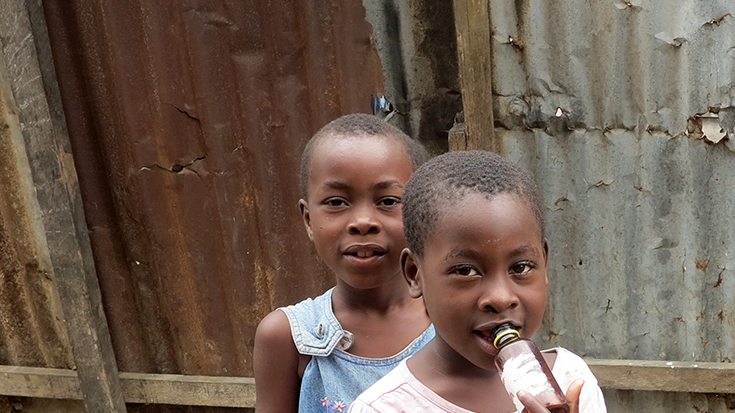During the preparation mission for the launch of the Lisungi program, we met a six-year-old girl named Saïra in Mvoumvou, a district in the port city of Pointe-Noire, whose family is benefiting from this program. Her 22-year-old mother Vanessa is raising on her own her four children ranging in age from two to eight years. They live in a wood shack in front of the district’s garbage dump. The last of five girls, this young woman explained her plight: “my sisters and I live apart ….our father died and our mother also lives on her own. I am living here on the plot of land left by my paternal grandmother and I am doing the best I can to feed my children.”
With very few years of schooling and no professional qualifications, Saïra’s mother is living in such precarious conditions that she had never envisioned being able to send her children to school. However, with the help of staff of the CAS (local social assistance office) who identified this family for the Lisungi program just a few months ago, Saïra and her big sister Séphora have begun attending school. The Lisungi program will in fact cover the children’s school fees and health care costs for a few years. Saïra very proudly told us that both she and her sister are in “the beginners’ class” (First Grade), and showed us their uniforms and schoolbags provided by caring neighbors.
At this point in time, the opportunity to go to school makes Saïra very happy. When asked what career she would like to pursue, she responded immediately: “I want to work on airplanes when I grow up.” Obviously, it is highly unlikely that these little girls will be able to complete even primary school if their mother’s circumstances do not improve. When asked what type of assistance would help her better provide for her family and keep her children in school, Vanessa said that she wanted to learn sewing which is precisely the type of training she can get now under the Lisungi program.
The Lisungi program is in line with key strategic pillars of the National Development Plan ( PND 2012– 2016), by helping to promote social inclusion, equity, and poverty reduction. It contributes to improved household consumption by facilitating access to education and health care for children and access by the poorest households to income-generating activities. Sylvie Dossou, World Bank Country Manager for the Republic of Congo, noted that this program is indeed “a second chance for children to escape poverty and, most importantly, to break the intergenerational cycle of poverty.” It is indeed the educated and healthy children of today who will contribute to the development efforts of tomorrow.
Under these circumstances, little Saïra will perhaps be able to realize her dream!

